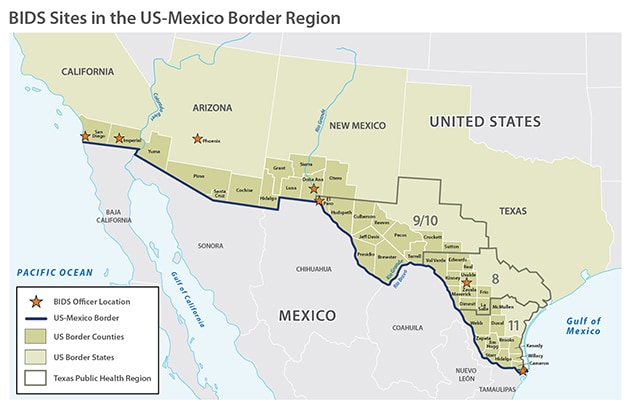Binational Border Infectious Disease Surveillance Program (BIDS)

Supporting local and state health departments to enhance surveillance and control of infectious diseases.
The BIDS program works closely with the four US states on the US-Mexico border to foster local, state, and federal collaboration to improve detection, reporting, and prevention of infectious diseases of binational importance. BIDS program also partners with the US-Mexico Border Health Commission, an organization committed to providing international leadership to improve the health and quality of life along the US-Mexico border. In alignment with the Global Health Security Agenda, BIDS projects address a wide range of diseases including COVID-19, influenza, tuberculosis, and vector-borne and foodborne diseases.
BIDS program’s goals:
- Improve surveillance for infectious diseases of binational importance
- Develop strategies to control infectious diseases in the border region
- Implement the Operational Protocol for Binational Communication and Coordination on Disease Notifications and Outbreaks [PDF – 39 pages] for bilateral infectious disease preparedness and response
CDC’s Division of Global Migration Health funds projects that align with the BIDS Program’s goals. State and local public health agency recipients can address unique epidemiologic and communication needs of the diverse and dynamic border region. CDC also provides technical assistance to funding recipients and facilitates coordination with the Mexican Ministry of Health.

View Full Size PDF - 1 page
2020–2024 Funding Recipients:
BIDS partners implement and enhance surveillance, communication, and preparedness to identify and report binational disease cases, notify public health partners about shared cases, and exchange epidemiologic information.
Surveillance
Surveillance activities are tailored to local disease control priorities. BIDS partners may also conduct special projects to inform surveillance needs.
Examples include:
- Surveillance for respiratory illnesses, including influenza and COVID-19, in border communities and border-crossing populations.
- Conducting surveys at US-Mexico land ports of entry to understand border crossers’ mobility patterns, as well as knowledge, attitudes, and practices related to COVID-19 and other diseases.
- Incorporating the binational variable [PDF, 88K, 5 pages] into surveillance databases for reportable conditions, which flags cases of disease related to Mexico that may require binational notification or coordination.
- Investigation of binational contacts for tuberculosis cases in Imperial County, CA, and Mexicali, Baja California, Mexico.
Communication and Preparedness
The BIDS program promotes systematic communication among partners and preparedness for infectious disease outbreaks. These activities prepare BIDS partners to detect and respond to illnesses and events of binational significance.
Examples include:
- Enhancement of surveillance systems to identify binational cases.
- Notification about binational disease events, such as COVID-19 and tuberculosis, to promote awareness and follow-up by US and Mexico health officials.
- Coordination and facilitation of annual public health preparedness exercises to build partnerships and test communication pathways.
- In 2017-2018, BIDS partners led infectious disease preparedness tabletop exercises in California, Arizona, and jointly in New Mexico and Texas.
- In 2017, BIDS partners participated in a salmonella outbreak exercise organized by Mexico’s Ministry of Health.
- Creation and adoption of the:
- Technical Guidelines for United States-Mexico Coordination on Public Health Events of Mutual Interest [PDF – 31 pages]
- Operational Protocol for Binational Communication and Coordination on Disease Notifications and Outbreaks [PDF – 39 pages]
- Infectious Disease Prioritization for Multijurisdictional Engagement at the United States Southern Border Region
The Guidelines were developed by the U.S. Department of Health and Human Services (HHS) and the Secretariat of Health of Mexico, and were formally adopted by both countries through a Letter of Intent at the World Health Assembly on May 22, 2012.
The guidelines provide a framework for
- ongoing exchange of binationally relevant epidemiologic information, and
- jointly coordinated responses to public health events that affect both countries.
The framework covers routine events, such as the regular movement of people across the border who require follow-up for tuberculosis, and emergency events, such as response to pandemic influenza.
US and Mexican federal health authorities have been collaborating since 1999 to detect and monitor infectious diseases along the US-Mexico border. Since then, the BIDS program has evolved to address changing epidemiological and laboratory priorities. To learn more about how BIDS started, read The U.S.-Mexico Border Infectious Disease Surveillance Project: Establishing Binational Border Surveillance (2003).
